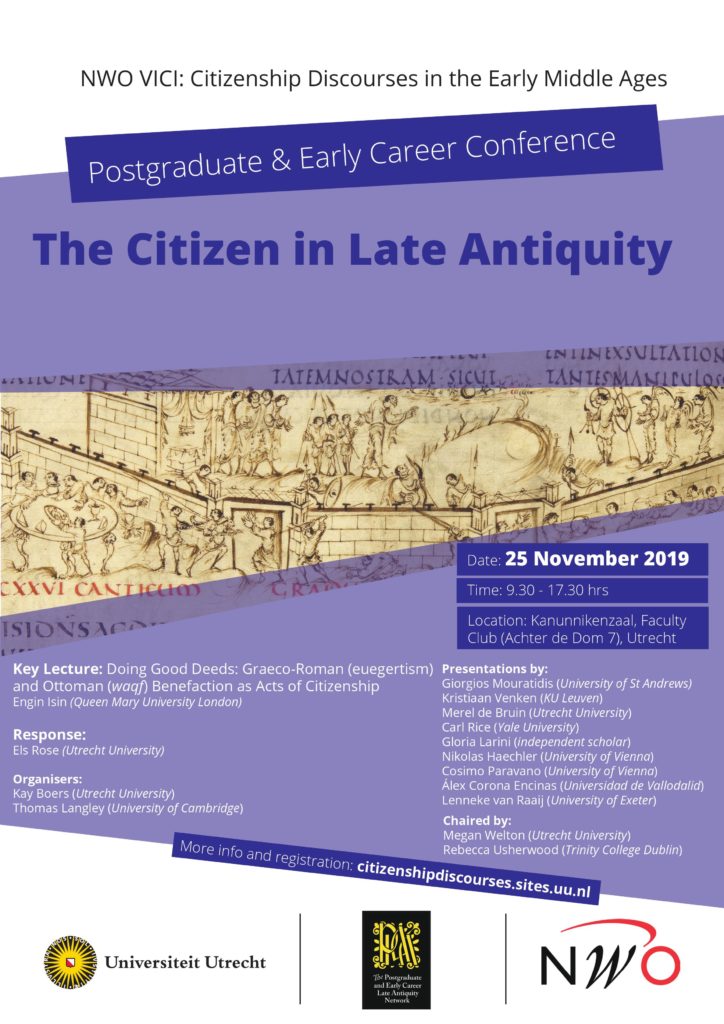Events
The Citizen in Late Antiquity
 The Citizen in Late Antiquity Programme Abstracts and Readings 25-11-19
The Citizen in Late Antiquity Programme Abstracts and Readings 25-11-19
The Postgraduate and Early Career Late Antiquity Network
——————————————–
Participation is free of charge, but registration is required. Please register by contacting: K.Boers@uu.nl
——————————————–
‘Citizen’ in Late Antiquity was an emotive and complex term. In the classical world, the term not only signified the distribution of rights and duties of members of city and empire, but perhaps much more importantly reflected the intricate processes of inclusion and exclusion that shaped Greco-Roman culture in a myriad of ways. Conventional historiography, which tended to focus on legal citizenship almost exclusively, once characterized citizenship as defunct by the onset of Late Antiquity: it has argued that the mass enfranchisement of the edict of Caracalla and the gradual transformation – or collapse – of the classical city, turned the ‘citizen’ into an anachronism, with its social, cultural and political significance returning only at the onset of the Renaissance. Recent scholarship however has started to contest this view by positing that neither the collapse of the Roman Empire in the west nor the transformation of the classical city brought an end to the concept of the citizen.
Next to other forms of self-identification, such as gender, class and ethnicity, people in late Roman and post-Roman polities continued to imagine and conduct themselves as citizens and these categories could themselves be understood in terms of legal and social citizenship. The citizen was also omnipresent in religious discourses, most significantly in late antique Christianity where the followers of Christ could either be perceived as citizens par excellence (viz. of the civitas Dei) or as intrinsic strangers and outsiders, namely to the civitas of the transitory world. Furthermore, citizens, of whatever kind, were also represented in material and visual culture, they took part, as citizens, in economic and artistic life and they appear most frequently in a vast number of textual sources and genres. An understanding of the full spectrum of ‘citizenship’ and ‘the citizen’ in Late Antiquity thus requires the use of a wide range of sources and approaches, and the fresh insights of a new generation of scholars.
This workshop, The Citizen in Late Antiquity, aims at providing an informal, constructive environment for post-graduate and early career researchers to present their work, meet others working in the field, and discuss current trends and issues. The Late Antiquity Network provides a single platform for those working on a broad range of geographical and disciplinary areas within the period of Late Antiquity, and participants are thus encouraged to interpret ‘citizen’ in a broad sense, thinking about how the theme intersects with their own research. Papers will be of twenty minutes, with ten minutes allocated for discussion. Facilitating this will be an address by our visiting speaker, Professor Engin Isin of Queen Mary University London, an acclaimed and prolific theorist on the subject of citizenship. The workshop is generously supported and hosted by the Dutch NWO VICI research project “Citizenship Discourses in the Early Middle Ages” and the Utrecht Centre for Medieval Studies (UCMS) at Utrecht University.
Programme
9:30 – Registration
10:00 – Welcome & Opening Remarks
10:05 – Keynote: Professor Engin Isin, Queen Mary University, London – ‘Doing Good Deeds: Graeco-Roman (euergetism) and Ottoman (waqf) Benefaction as Acts of Citizenship’
Response: Professor Els Rose, University of Utrecht
11:15 – Tea & Coffee
11:30 – Session I – Multiple Citizenships and Being a Citizen in the Imperial Period and Late Antiquity
- Giorgios Mouratidis, University of St Andrews – ‘Athletes and the Phenomenon of Multiple Citizenship during the Imperial Period’
- Kristiaan Venken, KU Leuven – ‘Unity and Division of Civitas Dei and Civitas Terrena’
- Merel de Bruin, University of Utrecht – ‘Civis and Civitas on Earth and in Heaven: Citizenship Discourses in the Sermons of Augustine, Maximus of Turin and Peter of Ravenna’
Chair: Kay Boers, University of Utrecht
13:00 – Lunch
14:00 – Session II – Citizen and Non-Citizen: Inclusion and Exclusion
- Carl Rice, Yale University – ‘Religio and the Civic Subject in the Later Roman Empire: Two Manichean Case Studies’
- Gloria Larini, Independent Scholar, formerly Scuola Normale, Pisa – ‘Prudentius’s Psychomachia as Political Allegory: the Christian-Roman Man and the Heritage of Mos Maiorum’
- Nikolas Haechler, University of Vienna – ‘Jewish Citizens under the Reign of the Emperor Heraclius (610-641). Forceful Inclusion of Marginalised Groups as a Strategy of Resilience in the Face of Political Crisis’
Chair: Thomas Langley, University of Cambridge
15:30 – Tea and Coffee
15:50 – Session III – Citizens and Civic Government: Citιes and their Rulers in the Long Late Antiquity
- Cosimo Paravano, University of Vienna – ‘Libanios on the City Councils: From Source to Agent’
- Álex Corona Encinas, Universidad de Vallodalid – ‘Political Transformations and Citizenship in the Early Byzantine City’
- Lenneke Van Raaij, University of Exeter – ‘The Return of the Civitas: The Episcopal City in the High Middle Ages’
Chair: Dr Megan Welton, University of Utrecht
17:20 – Open Discussion – Chaired by Dr Rebecca Usherwood, Trinity College Dublin
17:50 – Closing Remarks

